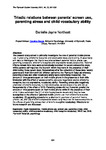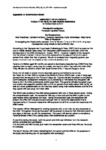Triadic relations between parents’ screen use, parenting stress and child vocabulary ability
| dc.contributor.author | Northcott, Danielle Jayne | |
| dc.date.accessioned | 2021-07-08T19:40:53Z | |
| dc.date.available | 2021-07-08T19:40:53Z | |
| dc.date.issued | 2021 | |
| dc.identifier.citation |
Northcott, D.J. (2021) ‘Triadic relations between parents’ screen use, parenting stress and child vocabulary ability’, The Plymouth Student Scientist, 14(1), pp. 621-638 | en_US |
| dc.identifier.uri | http://hdl.handle.net/10026.1/17318 | |
| dc.description.abstract |
The present study aimed to primarily investigate the role of parental mobile phone use in predicting children’s receptive and expressive vocabulary ability. A secondary aim was to investigate the triadic relations between parents’ mobile phone use, parenting stress and children’s receptive and expressive vocabulary ability. Parents’ iPhone screen time data were automatically recorded for seven consecutive days, whilst parents self-reported the hours in which they were in the presence of their child during those seven days. Successively after the collection of these data, twenty parents and their 36-month-old children came into the Plymouth BabyLab whereby parenting stress and child vocabulary ability were controllably measured. The amount of time parents spent on their mobile phone in the presence of their child interacted with the effect of socioeconomic status to negatively predict children’s receptive, but not expressive, vocabulary ability. Parenting stress also negatively predicted children’s receptive, but not expressive, vocabulary ability, and did so independently of the effect of SES. Parenting stress did not, however, predict the amount of time parents spent on their mobile phone whilst in the presence of their child. It was concluded that (1) children’s expressive vocabulary may be less susceptible to the effects of parental mobile phone use than children’s receptive vocabulary, (2) parenting stress is not a short-term predictor of parents’ mobile phone use, and (3) children’s expressive vocabulary may also be less susceptible to the effects of parenting stress than children’s receptive vocabulary. Directions for future research are discussed. | en_US |
| dc.language.iso | en | en_US |
| dc.publisher | University of Plymouth | en_US |
| dc.rights | Attribution 3.0 United States | * |
| dc.rights.uri | http://creativecommons.org/licenses/by/3.0/us/ | * |
| dc.subject | triadic relationships | en_US |
| dc.subject | mobile phone use | en_US |
| dc.subject | screen use | en_US |
| dc.subject | parenting stress | en_US |
| dc.subject | child vocabulary ability | en_US |
| dc.subject | child expressive vocabulary | en_US |
| dc.subject | child receptive vocabulary | en_US |
| dc.subject | WinG test | en_US |
| dc.subject | SES | en_US |
| dc.subject | Plymouth BabyLab | en_US |
| dc.subject | psychology | en_US |
| dc.title | Triadic relations between parents’ screen use, parenting stress and child vocabulary ability | en_US |
| dc.type | Article | en_US |
| plymouth.issue | 1 | |
| plymouth.volume | 14 | |
| plymouth.journal | The Plymouth Student Scientist |




